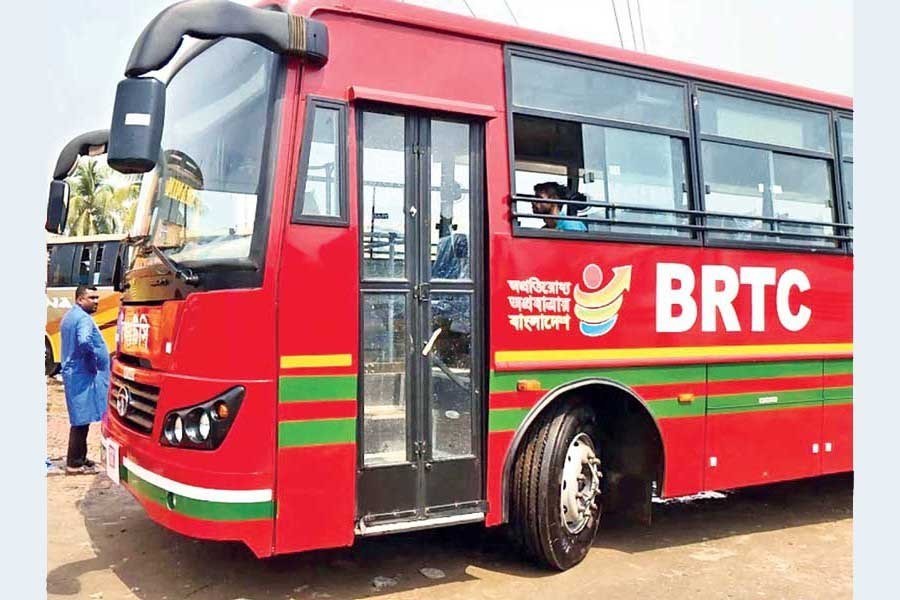The Bangladesh Road Transport Corporation (BRTC) looks intent on turning into a rental service as it engages 30 per cent of its fleet as staff and student buses.
The state transport corporation does so as it seeks to manage its income from inoperative buses and save its traditional image as a loss-making entity.
Despite high demand for public transport, sources say, the BRTC cannot use one third of its buses on routes due to end of their economic life but it rents those to different state agencies and universities.
The number is rising due to a wrong policy of purchasing BRTC buses from different countries and mishandling those by its staff members, they alleged.

Latest BRTC data shows 338 out of 1,279 buses now run as staff buses of 41 government agencies and public universities, earning 50-90 per cent for different depots per month.
Some 49 buses are being used for students of Dhaka University while 25 others for Jahangirnagar, Jagannath and other universities.
BRTC sources say these buses are hired on a seating-capacity basis for both pick-and-drop services by organisations like secretariat, state banks, Supreme Court, land survey offices, Titas and Palli Bidyut.
The BRTC has bought nearly 1,200 buses since 2002 from India, Korea and China, making it a fleet of over 1,600 with air-conditioned, non-AC and double-decker options.
But records show over 300 buses remain either under heavy maintenance or total abandonment for the end of their economic life or damage during accidents or fire.
The buses that burned during violence also remain in the 1,600 fleet until January 2022 as those are up for auction yet.
Renting buses is mainly to earn some bucks for BRTC as it tries to manage daily earnings from these life-expired buses, said an official.
Using these buses as public transports is costly when it comes to frequent repairs, he added.
"BRTC was not smart in making all the buys as most buses turn unfit within a few years of procurement."
The BRTC bought 275 CNG-run buses of Chinese Dongfeng which turned unfit within two years while 250 Korean DAEWOO AC buses could not run with AC on either for excessive fuelling or mechanical fault.
These buses were purchased from 2009 to 2013.
Earlier, the BRTC purchased 50 Volvo double-deckers from Sweden having 15 years of economic life after 2002 but despite its quality, buses went out of order within six to seven years.
It is alleged that corruption, mismanagement and inefficient servicing and mechanical support acted behind turning those buses unfit before their natural economic term.
Some 50 articulated buses from India also turned inoperative due to damage done to their costly belts.
The BRTC have tried to repair the belts in order to make them operative on the 300-feet road, a new route between Kuril flyover and Gausia of Narayanganj.
Talking to depot managers, the FE found that Motijheel Depot manages to earn nearly 50 per cent of its monthly income from staff buses.
It rents 48 out of its 136 operational buses as staff buses. But the depot has 182 buses and 46 of which are totally inoperative.
Depot manager Md Masud Talukder told the FE that Tk 5.0 million was earned from the staff bus service against Tk 31.7 million last December.
However, Kalyanpur Depot earned 90 per cent of its monthly earnings from renting service by using 59 buses as staff buses during the same period.
The depot maintains around 133 buses operational from its total 181 buses as 48 were totally abandoned.
BRTC student buses are, however, used as public transport when universities remain closed as they make two to three trips to make some income.
The FE also found some buses running between Motijheel-Gulistan and Gabtoli through Farmgate and between Motijheel and Uttara-Abdullahpur carrying the names of university buses as educational institutions remain closed for two weeks for coronavirus.
These buses are rented at Tk 2.15 per kilometre trip and minimum Tk 10 as announced by the Bangladesh Road Transport Authority for public transport. But university buses run with 60 per cent lower than the actual BRTA rate.
BRTC officials claim the state transport operator has been managing an operating profit for months by using its fleet on this kind of time-based services. Earnings were negative in July 2020 but posted surplus with Tk 2.5 million in July 2021.
BRTC records show its surplus earnings coming since 2019-2020. Despite Covid-19, its earnings were surplus through making maximum buses operative.
It had Tk 191-million surplus until December.
"And it continued into other months till now," said a senior BRTC official, adding that it has already paid dues of monthly salaries and many other arrears.
But he admits that the rental option is not the real mandate of the BRTC as it is trying to provide need-based service.
Te official says the articulated bus service runs on an exclusive BRTC route in the new township of Purbachal.


